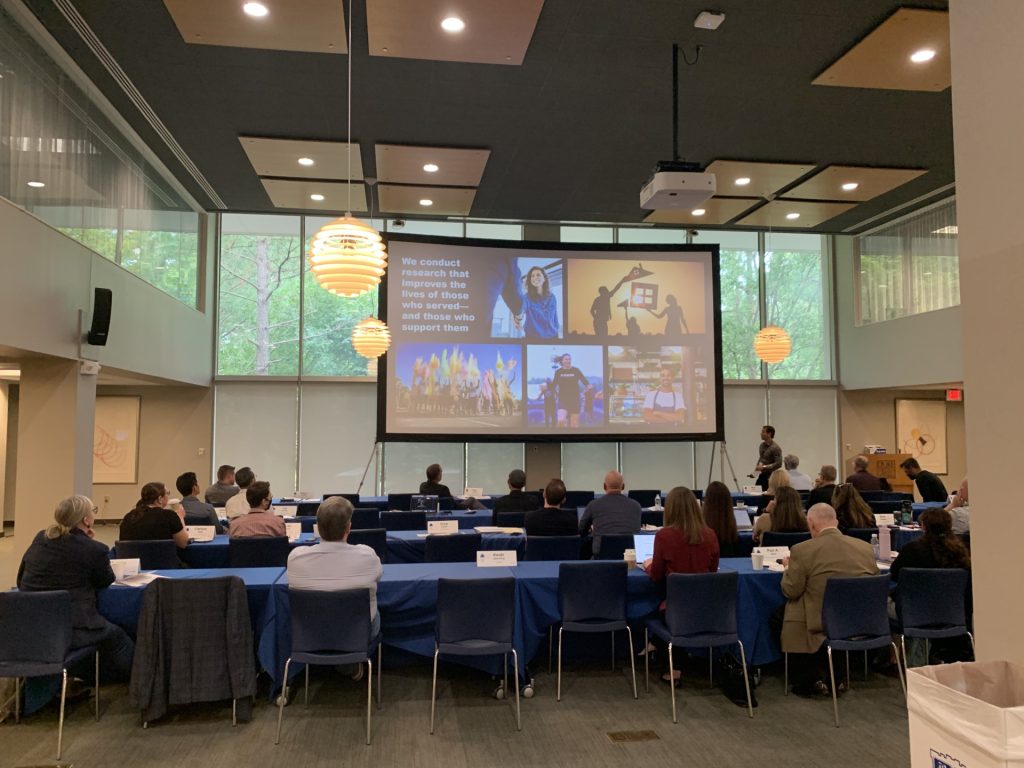Duke in DC’s latest Beyond Talking Points program featured discussion about climate financing and the role of federal incentives in the wake of the 2022 Inflation Reduction Act (IRA), which some argue is the largest investment by the federal government into climate resilience efforts.
Our panel of Duke experts, including the Nicholas Institute’s Jackson Ewing, the Pratt School for Engineering’s Judy Ledlee, Duke Law’s Lee Reiners and moderated by the Nicholas School for Environment’s Interim Dean Lori Bennear, discussed what we mean when we say climate finance, the work already being done in the public and private sectors and how crucial incentivizing investment at the policy-making level will be to the future of planet earth.
Recommendations to policymakers as conversations continue about climate financing:
Judy Ledlee
“Continue funding, research funding, and translational funding that brings communities to the table, as part of the solutions development. I think making this, climate tech revolution more equitable and bringing more people to the table would be my dream.”
Jackson Ewing
“Improve implementation capacity at your subnational levels, which is the jurisdictions that you’re operating within. We need more people and resources at the state and municipal levels to implement these policies.”
Lee Reiners
“I do think, climate risk is financial risk, and it is important for companies to disclose this information. It is relevant.”
On the Inflation Reduction Act and mobilizing its capital:
Lee Reiners
“These funds will be delivered through a mix of tax incentives, grants, and loan guarantees. Clean electricity and transmission command the biggest slice of those incentives followed by clean transportation, including, electric vehicle incentives. In terms of incentives for private investment, the biggest are, the investment tax credit and the production tax credit, both of which have been around for a while. And the IRA extended them through the end of 2024 and then created two, technology-neutral credits to replace them for projects placed in service starting in 2025.”
On the complications of implementing the IRA:
Jackson Ewing
“We’ve been talking a lot about the incentives that make up the bulk of the IRA, which are enormously important. They are only as strong as kind of the regulatory and business environment in which they’re operating. And so you still have the existence of bottlenecks that limit the amount of infrastructure that can be built. And so by extension, the amount of finance that can be deployed for that purpose. I think that the top of that list is permitting. And so, you know, when I mentioned previously that if we really are serious about scaling up our domestic production and deployment of many of these industries and technologies from batteries to solar, to wind, to larger transportation, electrification, etcetera, that we’re going to have to, move away from our sources of the minerals and metals and other inputs, that we currently use, for those products and start to develop more of them here in the US.”
Judy Ledlee
“Getting this additional funding into research is really, catalyzing and inspiring a lot of research in crucial areas like energy storage, hydrogen, even fusion, grid management. So getting this research and these innovations, the core technologies developed is incredibly powerful. And then secondly, helping these translational efforts going beyond research into actually, creating companies and around implementing these technologies and getting them out in the real world. And so what’s really important here is actually having government funding, like was mentioned earlier, de-risk some of these solutions so that, you know, private funding can come in afterward. And it’s so important as we think about climate tech, it’s hard tech and requires so much capital to start up and also long-term stability for these fundings so that people can develop plans around them. You know, starting with Solar Jet takes years in order to just set the groundwork for it, you know, so long-term funding, probably a lot of funding, and examples of this that I’ve seen, you know, coming from even the Chips Act is this new, NSF regional engine program that is, an exciting way of spring economic growth and localized communities actually, providing like $160,000,000 for up to 10 years for regional innovation ecosystems. And this isn’t particular to climate tech, but it’s, a really good mechanism to inspire climate tech because it has that large, large dollar amount and longer timeline as well.”
On public-private sector investments:
Lee Reiners
“It’s probably not an either-or, it’s probably a both. And so what circumstances make sense for federal investment versus private sector investment? Yeah. It’s definitely a both. So the reality is that given, the scale of the of the issue, you know, this is not something that the government can solve on its own, certainly given, debt constraints, and it’s something that the private sector can’t solve on its own. So you really need both the government and the private sector working together, and that’s what you see, with those capital flowing into clean power and deep capital flowing into clean power and decarbonization, but there’s not because of risk-return profiles, you know, don’t meet investors’ criteria. So, you know, the end goal really is so, you know, these IRA programs are designed to either increase returns, right, for, private capital providers, reduce risk, or both with, you know, the hope that it sort of crowds in. Private capital is a term you hear a lot. And so, hopefully, you know, once that happens, you will drive down the cost of these projects and technologies so they get to the point of what we call bankability, simply meaning that these projects and technologies can get private capital on their own and kind of stand on their own two feet.”
On equitable access to climate financing solutions:
Judy Ledlee
“How can we actually ensure that those climate tech solutions are equitable and accessible to all communities, particularly to marginalized or vulnerable populations? With climate tech, while the core technologies can be used anywhere, actually implementing these solutions will require localized special knowledge because they have to interact with the natural environment in any different location is gonna have its own nuances there. So it’s a way that we can really bring a lot of people to the table that weren’t necessarily part of the digital revolution. And so I hear like I want to encourage policymakers and, funders to really prioritize efforts that bring diverse groups of communities to the table for these tech transfer and commercialization opportunities. We want to create a new generation of leaders who can, help champion their solutions in their particular locations as well as also bring in, communities who who weren’t at the table for part of it and, for, like, the digital revolution.”
Jackson Ewing
“Historically, we’ve seen, you know, it’s been easier to cite certain types of facilities in places that, have lower socioeconomic status or, are, linguistically isolated. And one of the goals or the hopes with the clean energy transition is that we’ll be able to reduce that kind of energy injustice, the so-called energy sacrifice zones. But the sort of permitting issues that you’re talking about now perhaps suggest that we could end up repeating some of those mistakes.”
Jackson Ewing | Director of Energy and Climate Policy | Nicholas School of the Environment
Jackson Ewing is director of energy and climate policy at the Nicholas Institute of Energy, Environment & Sustainability at Duke University. He is also an adjunct associate professor at the Nicholas School of the Environment and a faculty affiliate with the Duke Center for International Development at the Sanford School of Public Policy. He works closely with the Duke Kunshan University Environmental Research Center and International Masters of Environmental Policy programs to build policy research collaboration across Duke platforms in the United States and China. He holds a doctorate in environmental security and master’s degree in international relations from Australia’s Bond University, and a bachelor’s degree in political science from the College of Charleston.
Judy Ledlee |Executive Director of Design Climate | Nicholas School of the Environment
Judy Ledlee, Ph.D. is the Executive Director of Design Climate and is passionate about cleantech innovation and commercialization. Judy developed her passion for cleantech innovation during her doctoral studies at Duke University where she researched emerging water treatment technologies. From her work, she co-founded a startup for hydraulic fracturing wastewater recycling. After graduating, she continued her cleantech career in the water industry working for Evoqua (now Dupont and Xylem), Black & Veatch, and ZwitterCo. Throughout her career, she’s continued working on entrepreneurial and intrapreneurial activities and is excited to return to Duke and create opportunities for new generations of students to develop innovations for addressing climate challenges. She holds a Ph.D. and Masters from Duke University and her Bachelor of Science from Tufts University.
Lee Reiners |Lecturing Fellow, Financial Economics Center and School of Law
Lee Reiners is a lecturing fellow at the Duke Financial Economics Center and at Duke Law. At Duke, Reiners has taught classes on FinTech Law and Policy, Cryptocurrency Law and Policy, Financial Regulatory Policy, Climate Change and Financial Markets, and Cybersecurity Law and Policy. His broad research agenda focuses on how new financial technologies and climate change fit within existing regulatory frameworks. He holds a master’s in Public Policy from Duke University.
Moderated by:
Lori Bennear | Professor of Energy Economics and Policy | Stanback Dean of the Nicholas School of the Environment
Lori Bennear’s research focuses on evaluating environmental policies and improving methods and techniques for conducting evaluations. While the field of policy evaluation is a broad one, her specific niche is in bringing rigorous quantitative methods to evaluate environmental policy innovations along four dimensions (1) Evaluating the effectiveness of environmental policies and programs, (2) Evaluating strategic behavioral responses to non-traditional regulatory regimes, (3) Assessing the distributional impacts of these new regulatory regimes and (4) Evaluating the role of program evaluation in environmental policy. She holds a Ph.D. from Harvard and Masters from Yale University.
In case you missed it, watch the full conversation here.
















